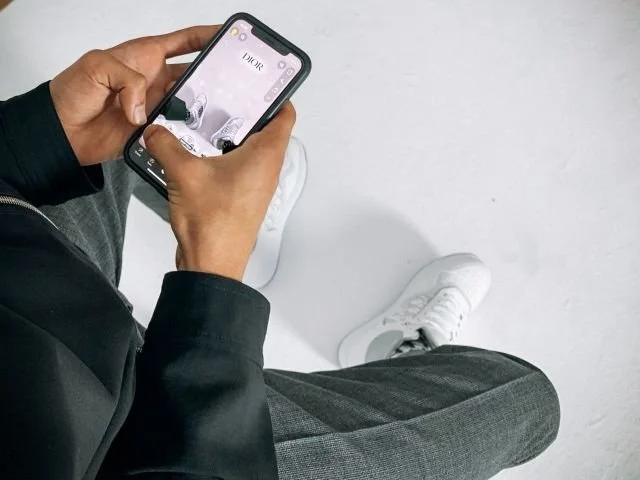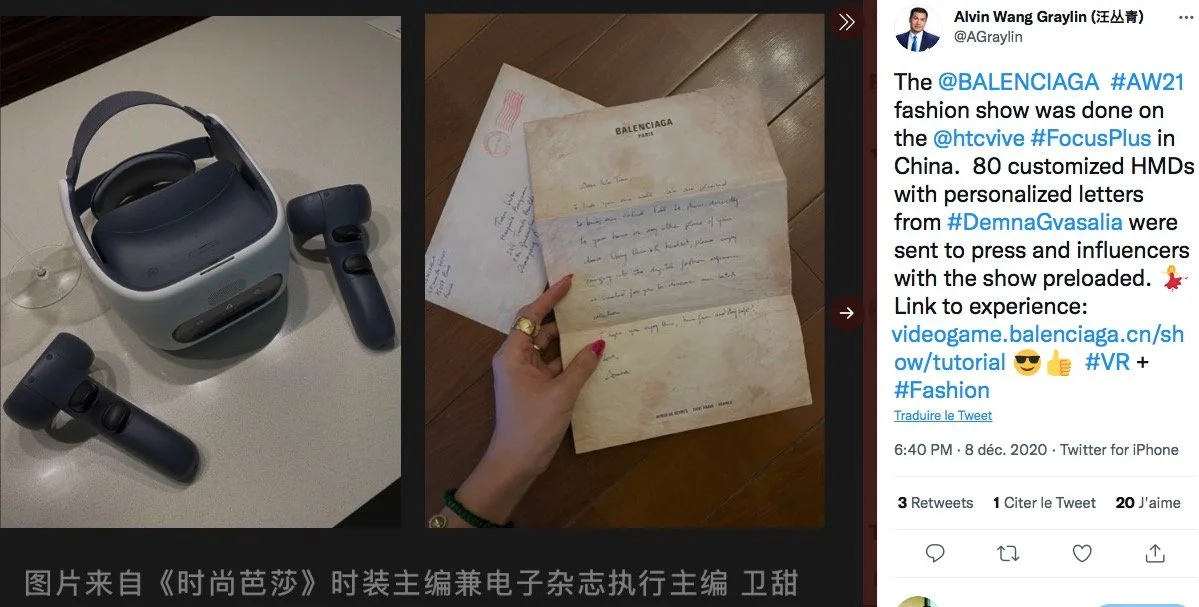1/2 - What technological developments for fashion and luxury, since the pandemic? This is the question asked by Eugénie Benhamou, co-founder of the startup specialized in data science and artificial intelligence Factonics, in her white paper dedicated to the transformations experienced by the retail sector, following the Covid-19 crisis. Interview.
By Ludmilla Intravaia
Le Boudoir Numérique: You are the co-founder of Factonics, a startup specializing in artificial intelligence and data science, created in 2017. What is your company's mission?
Eugénie Benhamou, luxury retail and customer experience expert at Factonics: Our ambition is to democratize the use of artificial intelligence in companies, by proposing use cases for luxury, fashion or beauty on our platform of management, designed two years ago. Our collaborative and simple vision of data is not aimed at specialists who already speak its language, but at trades people who do not master it to help them harness the value of data for the benefit of their company.
You signed a white paper on fashion and luxury, entitled "The new AI challenges in the post-crisis retail sector", in which you observe that "the year 2020 will go down in the history of retail, as a year marked by the beginning of an unpredictable crisis, leading to an unprecedented transformation of the sector”. What changes has the pandemic brought about for fashion brands and luxury houses?
The health crisis has proven to be an accelerator for the integration of new technologies to which the luxury and retail sector was not at all used and has led to behavioral changes among consumers. Thus, the latter having over-consumed on websites, e-commerce performed in 2020 and still performs in 2021. Despite an unfavorable situation for many brands, the economic difficulties experienced by the players in the physical stores were offset by this online growth, seen by some as an opportunity for innovation, an opportunity to take a more detailed look at technology. An approach that goes hand in hand with the use of artificial intelligence to take advantage of all this data left online by consumers, in order to provide them with a more personalized customer experience.
Virtual try-on of Dior sneakers, November 2020 (© Dior)
What technologies have boomed during the Covid-19 crisis?
Post-crisis, we saw the emergence of new perspectives offered, for example, by augmented reality and virtual reality, which houses have put to good use. In December 2020, Balenciaga unveiled a collection via a VR headset, supplied to professionals in lockdown all around the world, to attend Demna Gvasalia's show. At the same time, Gucci opened an augmented reality portal on Snapchat, while Dior collaborated with this application for a virtual try-on of sneakers, in order to try them virtually, share images, get likes, comments and feedback from other Internet users. From a consumer point of view, the initiatives of these houses which have tested these new tools have been a success.
Screenshot of a Twitter post on receiving a virtual reality headset to attend Balenciaga's AW21 show, December 2020 (© Alvin Wang Grailing)
What are the advantages of augmented reality for a luxury brand?
With augmented reality, luxury houses have found an almost infinite playing field that allows them to express their creativity on this kind of large artistic canvas that is very attractive to customers. In this retailtainment perspective combining commerce with entertainment, on social networks where you can make online purchases in just three clicks, the retail space is transformed into a connected place where you can live an emotional and interactive experience. And that speaks to Generation Z, whose reflection is augmented reality and Snapchat, one of their favorite networks.
Gucci Bloom Portal, November 2020 (© Snapchat)
What are the consumption habits of this Gen Z?
This generation needs to have an emotional experience in the act of buying, while having a more reasoned attitude, greener for example, than the previous generation. This customer is fond of digitization, of purchasing through social networks, which reinforces his choice through likes and other interactions with Internet users. Augmented reality has allowed luxury houses to introduce them to new products, even though these consumers could no longer go to physical stores.
Not to mention that In Real Life luxury boutiques are sometimes intimidating...
Indeed. Augmented reality is a beautiful interactive showcase that appeals to a rejuvenating clientele, between the ages of 15 and 25 on average, who feel it exists through luxury, without having to push the door of a boutique in rue du Faubourg-Saint-Honoré. In this sense, augmented reality appears to be an excellent compromise to make luxury more attractive but also more accessible, a strong trend for the moment.
* Factonics white paper 2021 “Les nouveaux enjeux IA dans le secteur retail post-crise” ("The new AI challenges in the post-crisis retail sector") is available, in french, here.
* Read the second part of Eugénie Benhamou's interview on Le Boudoir Numérique: "In the future, I see virtual luxury stores with avatars".
Eugénie Benhamou, co-founder of Factonics, September 14, 2021, in Paris (© Lionel Samain for Le boudoir Numérique 2021)
* You don’t want to miss any fashion tech and beauty tech news ? It’s easy, subscribe to Le Boudoir Numérique newsletter !
* Continue reading with these following Boudoir Numérique articles :
- "Atelier Loden coats are intended for the greatest number, not the elite"
- "With Atelier Loden, I wanted to make a meaningful coat"
- Ikeuchi Hiroto creates cybernetic face coverings for Balenciaga
- H&M's vegan collection showcased in Animal Crossing
- Stella McCartney at COP26: "The future of fashion and our planet is cruelty-free"
- Co-Exist Story, H&M's first vegan collection approved by PETA
- Innovation - Special feature on vegan and cruelty free fashion and beauty
-Balenciaga LED Frame sunglasses are finally here
-With AI, Refik Anadol creates "an alternative reality of nature" for Bulgari
-Peurce, vegan and eco-friendly leather goods in AppleSkin
-Bombo, innovative and more sustainable lingerie
-Paris FW SS22 - Stella McCartney unveils on the runway her first vegan bag in Mylo unleather
-Paris FW SS22 - Anrealage travels through the virtual universe of the Japanese anime Belle
-Le Boudoir Numérique follows Natalie Portman in the virtual world of Miss Dior
-Hailee Steinfeld wears a dress in recycled plastic by Iris van Herpen at MET Gala 21
-Cristóbal Balenciaga was not playing Fortnite, Demna Gvasalia does
-The robot Ai-Da wears a living crystal dress by Auroboros
-Tessa Thompson in Iris van Herpen's Syntopia dress at the MET Gala 21
-Grimes as an Iris van Herpen warrior at the MET Gala 2021
-Gabrielle Union wears a laser-cut dress by Iris van Herpen at the MET Gala 2021
-The fashion tech moment of RuPaul's Drag Race All Stars 6: Ginger Minj as Fergie at the Super Bowl
- Meet the avatars of Tomorrow X Together in the virtual world of Ralph Lauren X Zepeto





